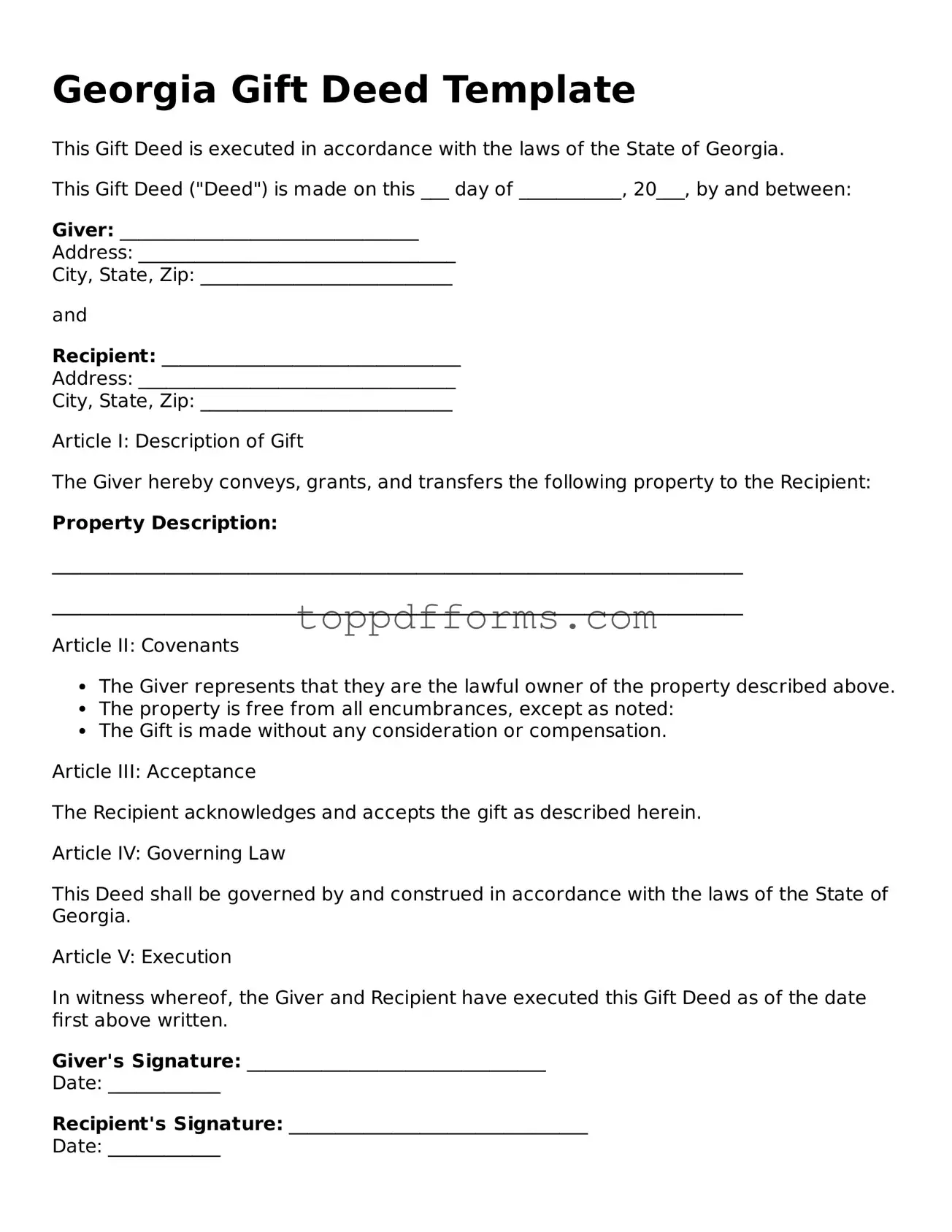Gift Deed Document for Georgia State
Things You Should Know About This Form
What is a Georgia Gift Deed?
A Georgia Gift Deed is a legal document used to transfer ownership of real property from one person to another without any exchange of money. This deed signifies that the property is given as a gift, and the donor does not expect anything in return.
Who can use a Gift Deed in Georgia?
Any individual who owns real property in Georgia can use a Gift Deed to transfer their property to another person. This can include family members, friends, or any other individual the donor chooses to gift the property to.
What information is required on a Gift Deed?
The Gift Deed must include the names and addresses of both the donor and the recipient, a legal description of the property being transferred, and the date of the transfer. Additionally, it should state that the transfer is a gift and not a sale.
Do I need to have the Gift Deed notarized?
Yes, a Gift Deed must be signed in the presence of a notary public. This helps to verify the identities of the parties involved and ensures that the deed is legally binding.
Are there any tax implications for a Gift Deed in Georgia?
Yes, there may be tax implications. The donor may need to file a gift tax return if the value of the property exceeds the annual exclusion limit set by the IRS. It is advisable to consult a tax professional to understand the specific implications.
How do I record a Gift Deed in Georgia?
To record a Gift Deed, you must take the signed and notarized document to the county clerk's office where the property is located. There may be a small fee for recording the deed, and it is important to keep a copy for your records.
Can a Gift Deed be revoked?
Once a Gift Deed is executed and recorded, it generally cannot be revoked unless the donor retains a life estate or if both parties agree to rescind the deed. Legal advice may be necessary for specific situations.
What happens if the donor dies before the Gift Deed is recorded?
If the donor dies before the Gift Deed is recorded, the property may still be part of the donor's estate. The intended recipient may need to go through probate to claim the property unless other estate planning measures are in place.
PDF Overview
| Fact Name | Description |
|---|---|
| Purpose | A Georgia Gift Deed form is used to transfer property ownership as a gift without monetary exchange. |
| Governing Law | The form is governed by the Official Code of Georgia Annotated (O.C.G.A.) § 44-5-30. |
| Requirements | The deed must be signed by the donor and notarized to be legally binding. |
| Tax Implications | Gift tax may apply depending on the value of the property and the relationship between the donor and the recipient. |
| Recording | To protect the recipient’s interest, the deed should be recorded with the county clerk's office where the property is located. |
Common mistakes
When filling out the Georgia Gift Deed form, many individuals inadvertently make mistakes that can lead to complications down the line. One common error is failing to provide accurate descriptions of the property being gifted. A precise legal description is crucial; without it, the deed may be deemed invalid. Relying solely on a street address can lead to ambiguity, which can create issues in property transfer.
Another frequent mistake involves not including the correct names of the grantor and grantee. Both parties must be clearly identified to ensure that the transfer of ownership is legally recognized. Omitting a middle name or using an incorrect spelling can cause confusion and may result in legal challenges later.
Many people also overlook the necessity of having the deed notarized. In Georgia, a Gift Deed must be signed in the presence of a notary public to be valid. Failing to obtain this notarization can render the deed unenforceable, leaving the gift unrecognized by the state.
In addition, individuals often neglect to consider the tax implications of gifting property. While a gift may seem straightforward, it can have tax consequences for both the giver and the receiver. Not consulting a tax professional can lead to unexpected liabilities, which could have been avoided with proper planning.
Another common oversight is not understanding the implications of the gift on future property taxes. When property is gifted, its assessed value may change, impacting the new owner's tax responsibilities. Individuals should be aware of how this transfer affects their financial obligations moving forward.
Lastly, some people fail to keep a copy of the completed Gift Deed for their records. Documentation is essential in any legal transaction. Without a copy, it may be difficult to prove the terms of the gift or resolve disputes that arise later. Maintaining proper records is a key part of ensuring a smooth transfer process.
Other Common State-specific Gift Deed Forms
How Much Does It Cost to Transfer Property Deeds? - The proper completion of a Gift Deed may help minimize tax implications for both parties.
Completing a Texas Motor Vehicle Bill of Sale is crucial for both buyers and sellers, as it helps in documenting the details of the transaction and solidifying the ownership transfer. To simplify this process, you can find useful resources and access the necessary forms, such as the PDF Templates, to ensure that all legal requirements are met and the transaction goes smoothly.
Gift Deed Form Texas - The Gift Deed should specify whether the gift is subject to any conditions or contingencies.
